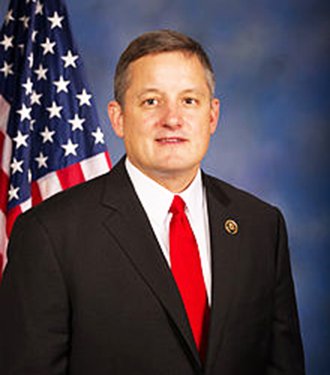A spokesman for U.S. Rep. Bruce Westerman, R-District 4, said the congressman was defending himself Monday when he questioned the salary of the executive director of a referral and advocacy service for the disabled.
Ryan Saylor, Westerman's communications director, said Tuesday the two-term lawmaker's response to a question about the Disability Integration Act of 2017 at a Coffee with your Congressman event at The Greater Hot Springs Chamber of Commerce was a reaction to criticism employees of Spa Area Independent Living Services have leveled at him.
Westerman asked the nonprofit's executive director, Brenda Stinebuck, about her salary and personnel costs paid from the organization's publicly funded budget.
"They spend time attacking him, protesting in front of his office, attacking him on social media," Saylor said. "He wanted to defend himself."
Saylor said questions Stinebuck and Amy Tweedle, the nonprofit's advocacy coordinator, asked Westerman Monday revealed the organization's proclivity for cloaking partisan motives in advocacy for the disabled.
"They say they are working for the disabled, but the problems we experienced with them is that they use their position to be political activists," he said. "That's the issue the congressman was trying to express. We've gone out of our way to cooperate with them and listen to them because they are our constituents.
"I think (Monday) is the latest example of them trying to be political activists rather than doing what their mission statement is."
Stinebuck said Tuesday that protests the nonprofit has organized at Westerman's Hot Springs office are consistent with its mandate to advocate for the disabled. She said some of its 20 employees are part of a disability rights advocacy group that is not affiliated with the nonprofit.
"We're not paid protesters," Stinebuck said. "One of our core services is advocacy. It's mandated through the federal funding we receive. We do it on a bipartisan basis. There are some members who do belong to a national civil disobedience group called ADAPT. They do that on their own time."
Westerman issued the following statement Tuesday regarding SAILS:
"It's important that we ensure that our federal tax dollars are spent wisely and that there is oversight of how those dollars are spent. While the clients of SAILS should be getting help from the federal government, I want to make sure that federal tax dollars are going to those in need and not to pay large salaries and overhead in the name of helping those in need.
"The SAILS family also appears to be a lot of just that, family -- with multiple family members working there. Some of those employees pride themselves on traveling to Washington, D.C. -- protesting and getting arrested multiple times at those protests. I'm curious if taxpayer-funded grants are paying travel expenses or salaries for those who are protesting. If so, how is that serving the needs of those with disabilities in Garland County and is it the best use of federal tax dollars?"
Federal tax reporting forms filed by the nonprofit show Stinebuck received $90,000 of compensation in 2016, $100,000 in 2015, $105,922 in 2014, $63,500 in 2013 and $60,000 in 2012.
According to the filings, government grants account for most of the group's funding. Stinebuck said the nonprofit is a Medicaid provider and receives funding from numerous granting agencies. It has an office in Hot Springs and in 2013 opened an additional office in White Hall to serve its 16-county area.
"My salary reflects that I run two offices," she said. "The salary is combined from both offices."
According to filings from 2011 to 2016, salary and benefits the nonprofit has paid to maintain a 15-to-20 person staff ranged from a low of $304,248 in 2011 to a high of $432,238 in 2015.
Westerman's annual salary is $174,000. According to the Congressional Research Service, members of the House of Representatives receive $944,671 a year to pay for a staff of up to 18 people.
Saylor said Westerman met with Stinebuck and her staff about disability-rights legislation twice in the spring of 2017, including hosting them at his Washington, D.C., office in May of that year.
"We've gone out of our way to meet with this group and to answer their questions," he said.
Stinebuck said she asked Westerman about the Disability Integration Act Monday because his office has not responded to repeated inquiries about the legislation since the May 2017 meeting. The bill requires disabled people who qualify for institutional placement also be offered community-based services for their long-term needs. Supporters of the bill said it will reduce long-term care costs by keeping the disabled out of nursing homes.
"He has never gotten back with us about his stance on the bill," Stinebuck said, adding that the nonprofit has invited Westerman to its Hot Springs office to discuss the issue later this month. "All we're asking is can you support this, and he's never given us a yes or no answer.
"I don't know why he's singled out our organization. We've asked to meet with him so we can work out these differences. He represents people with disabilities in the 4th District, and we're advocates for those people. We need to be able to ask questions about whether or not he supports legislation that affects their lives."
Local on 08/08/2018